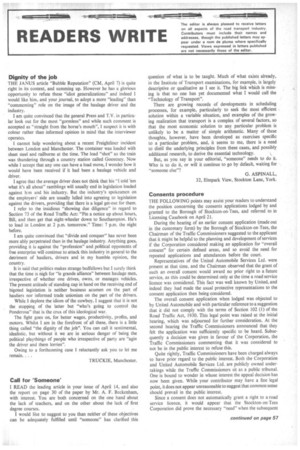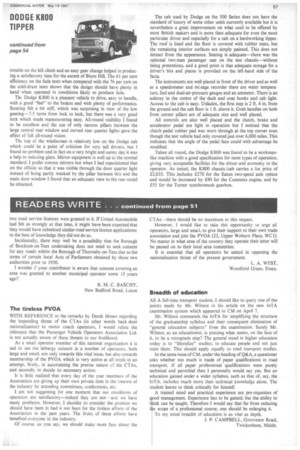READERS WRITE
Page 53

Page 59

If you've noticed an error in this article please click here to report it so we can fix it.
Dignity of the job
THE JANUS article "Bubble Reputation" (CM, April 7) is quite right in its context, and summing up. However he has a glorious opportunity to refute these "idiot generalizations" and indeed I would like him, and your journal, to adopt a more "leading" than "commenting" role on the image of the haulage driver and the industry.
I am quite convinced that the general Press and T.V. in particular look out for the most "gormless" and while such comment is accepted as "straight from the horse's mouth", I suspect it is with colour rather than informed opinion in mind that the interviewer operates.
I cannot help wondering about a recent Freightliner incident between London and Manchester. The container was loaded with sheet steel and railborne at the time. The load "shot" as the train was thundering through a country station called Goostney. Now while I accept that any one can have a load move, I wonder how it would have been received if it had been a haulage vehicle and driver.
I agree that the average driver does not think that his "I told 'em what it's all about" ramblings will usually end in legislation loaded against him and his industry. But the industry's spokesmen on the employers' side are usually lulled into agreeing to legislation against the drivers, providing that there is a legal get-out for them.
I refer to the insidious "showing due diligence" in regard to Section 73 of the Road Traffic Act: "Pin a notice up about hours, Bill, and then get that eight-wheeler down to Southampton. He's to load in London at 2 p.m. tomorrow." Time: 7 p.m. the night before.
I am quite convinced that "divide and conquer" has never been more ably perpetrated than in the haulage industry. Anything goes, providing it is against the "profession" and political opponents of free enterprise will continue to attack this industry in general to the detriment of hauliers, drivers and in my humble opinion, the country.
It is said that politics makes strange bedfellows but I surely think that the time is nigh for "le grande alliance" between haulage men, irrespective of whether one drives, owns, or manages vehicles. The present attitude of standing cap in hand on the receiving end of bigoted legislation is neither business acumen on the part of hauliers nor informed trade unionism on the part of the drivers.
While I deplore the idiom of the cowboy, I suggest that it is not the stopping of the latter but "who's going to control the Ponderosa" that is the crux of this ideological war.
The fight goes on, for better wages, productivity, profits, and motors. Whilst I am in the forefront of all these, there is a little thing called "the dignity of the job". You can call it sentimental, idealistic, but without it we are in serious danger of being the political playthings of people who irrespective of party are "agin the driver and them lorries".
Owing to a forthcoming case I reluctantly ask you to let me remain. .
TRUCKIE, Manchester.
Call for 'Someone'
I READ the leading article in your issue of April 14, and also the report on page 30 of the paper by Mr. A. F. Beckenham, with interest. You are both concerned on the one hand about the lack of teachers, and on the other about the lack of first degree courses.
I would like to suggest to you than neither of these objectives can be adequately fulfilled until "someone" has clarified this question of what is to be taught. Much of what exists already, in the Institute of Transport examinations, for example, is largely descriptive or qualitative as I see it. The big link which is missing is that no one has yet documented what I would call the "Technology of Transport".
There are growing records of developments in scheduling processes, for example, particularly to seek the most efficient solution within a variable situation, and examples of the growing realization that transport is a complex of several factors, so that the most economic solution to any particular problem is unlikely to be a matter of simple arithmetic. Many of these thoughts, however, have been developed as exercises specific to a particular problem, and, it seems to me, there is a need to distil the underlying principles from these cases, and possibly additional research, to derive the essential technology.
But, as you say in your editorial, "someone" needs to do it. Who is to do it, or will it continue to go by default, waiting for "someone else"?
G. ASPINALL, 32, Elmpark View, Stockton Lane, York.
Consents procedure
THE FOLLOWING points may assist your readers to understand the position concerning the consents applications lodged by and granted to the Borough of Stockton-on-Tees, and referred to in Licensing Casebook on April 21.
During the hearing of an earlier consent application (made out in the customary form) by the Borough of Stockton-on-Tees, the Chairman of the Traffic Commissioners suggested to the applicant that it might be helpful to the planning and development of services if the Corporation considered making an application for "overall consent" for certain defined areas, and so avoid the need for repeated applications and attendances before the court.
Representatives of the United Automobile Services Ltd. were present at that time, and the Chairman observed that the grant of such an overall consent would award no prior right to a future service, as this could be determined only at the time a road service licence was considered. This fact was well known by United, and indeed they had made the usual protective representations to the consent application then being considered.
The overall consent application when lodged was objected to by United Automobile and with particular reference to a suggestion that it did not comply with the terms of Section 102 (1) of the Road Traffic Act, 1930. This legal point was raised at the initial hearing, which was adjourned for further consideration. At the second hearing the Traffic Commissioners announced that they felt the application was sufficiently specific to be heard. Subsequently a decision was given in favour of the Corporation, the Traffic Commissioners commenting that it was considered to not be in the public interest to refuse this.
Quite rightly, Traffic Commissioners have been charged always to have prior regard to the public interest. Both the Corporation and United Automobile Services Ltd. are publicly owned undertakings while the Traffic Commissioners sit as a public tribunal. One is bound to wonder in whose interest the appeal decision has now been given. While your contributor may have a fine legal point, it does not appear unreasonable to suggest that common sense should prevail in the public interest.
Since a consent does not automatically grant a right to a road service licence, it would appear that the Stockton-on-Tees Corporation did prove the necessary "need" when the subsequent two road service licences were granted to it. If United Automobile had felt as strongly at that time, it might have been expected that they would have submitted similar road service licence applications; to the best of knowledge they did not do so.
Incidentally, there may well be a possibility that the Borough of Stockton-on-Tees undertaking does not need to seek consent for any roads within the Borough of Thornaby-on-Tees due to the terms of certain local Acts of Parliament obtained by those two authorities prior to 1930.
I wonder if your contributor is aware that consent covering an area was granted to another municipal operator some 15 years ago?
• R. M. C. BASCHY, New Bedford Road, Luton
The tireless PVOA
WITH REFERENCE to the remarks by Derek Moses regarding the impending threat of the CTAs (in other words back-door nationalization) to motor coach operators, I would refute the inference that the Passenger Vehicle Operators Association Ltd. is not actually aware of these threats to our livelihood.
As a small operator member of this national organization it is sad to see the lethargy existent in a number of operators, both large and small, not only towards this vital issue, but also towards membership of the PVOA which is very active at all levels in an attempt, firstly, in ascertaining the precise nature cf the CTAs, and secondly to decide its necessary action.
It is little realized that every day of the year members of the Association are giving up their own private time in the interest of the industry by attending committees, conferences, etc.
I am not suggesting for one moment that our conditions of operation are satisfactory—indeed they are not—and we have many problems. However, I shudder to consider the position we should have been in had it not been for the tireless efforts of the Association in the past years. The fruits of these efforts have benefited everyone in the industry.
Of course, as you say, we should make more fuss about the CTAs—there should be no maximum in this respect.
However, I would like to take this opportunity to urge all operators, large and smajl, to give their support to their own trade association and join the PVOA (22, Upper Woburn Place, WC1). No matter in what area of the country they operate their letter will be passed on to their local area committee.
It is essential that all operators be united in opposing the nationalization threat of the present government.
L. A. WEST, Woodford Green, Essex.
Breadth of education AS A full-time transport student, I should like to query one of the points made by Mr. Wilmot in his article on the new loTA examination system which appeared in CM on April 7.
Mr. Wilmot commends the loTA for simplifying the structure of the graduateship syllabus and their consequent elimination of "general education subjects" from the examination. Surely Mr. Wilmot, as an educationist, is praising what seems, on the face of it, to be a retrograde step? The general trend in higher education today is to "liberalize" studies; to educate people and not just train them. This should apply equally to road transport studies.
In the same issue of CM, under the heading of Q&A, a questioner asks whether too much is made of paper qualifications in road transport. If all paper professional qualifications were purely technical and parochial then I personally would say yes. But an education gained under a wider syllabus, such as that of, say, the loTA, includes much more than technical knowledge alone. The student learns to think critically for himself.
A trained mind and practical experience are pre-requisites of ad management. Experience has to be gained, but the ability to ink can be taught. Therefore I would say that far from reducing t e scope of a professional course, one should be enlarging it. To my mind breadth of education is as vital as depth.
J. P. CAMPBELL, Grosvenor Road, Twickenham, Middx.




















































































































